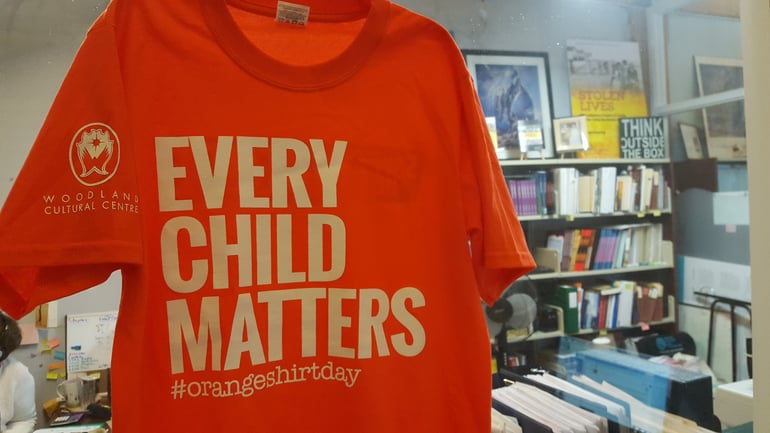On September 30th, communities will be coming together for Orange Shirt Day to

We hope each of these activities can serve as a jump off point for ongoing learning, and pursuance of truth and reconciliation.
1. Share Phyllis' Story... Aloud and In Person
Bring Phyllis (Jack) Webstad's story, her
If you can arrange for a post-performance talk, consider reading a contemporary piece, Culture, Stereotypes and Identity, which highlights some of the challenges Indigenous youth still face today in finding belonging; pairing these voices also brings to light the systemic nature and ongoing peresistence of historical trauma and racism today. To debrief these activities, here are some questions to explore:
- Ask students to consider what Phyllis, and youth from the Feathers of Hope have to say about what they need to feel secure in their identities.
- How might your community ensure that all children can feel secure in their identity and a sense of belonging?
- Who might you need to form relationships with in the community to help you create a sense of belonging for those who are not like yourself?
2. View "The Stranger" and journal or talk about it
After sharing her testimony with teachers at our Grade 10 History Seminar in August, Elder and Residential School survivor Shirley John asked us to watch "The Stranger," from the Secret Path. It was incredibly powerful after hearing her testimony and it was done with such safety and care.
In a Facing History classroom, we often ask students to journal as a way to clarify or process their thinking and emotions after encountering challenging or difficult content. After watching "The Stranger", students can journal with a free write, or respond using questions based on Facing History's pedagogical triangle:
%20(1).png?width=193&name=Triangle%20print%20medium%20color%20(7.5%20x%207.5%20inch)%20(1).png)
- what has this music/video helped you to better understand?
- what feelings does it evoke for you?
- what ethical questions does it raise for you?
- Over 150,000 Indigenous children were taken from their families into Residential Schools between 1880 - 1996. What is one step you can take in response to learning about this injustice?
Following or instead of journaling, if you have created a safe space for students to share, you can also invite students to speak in a talking circle; this First Nations approach to sharing is incredibly powerful - and what better way to show that every child matters in your classroom than to honour their voice or their silence?
*(Thanks Christina Nielsen for reminding me of this!): Please take care if you plan to bring content like The Secret Path or other testimony readings into your classroom. Have water, tissue, time and arrangements with a counselor made in advance, in the event the content is triggering. If you are able to smudge, Indigenous educators and elders have taught us that smudging can be used following sharing of difficult content.
3. Create a memorial to remember the victims of Residential Schools
You might ask students to read some testimonies from survivors of Indian Residential Schools to begin to get a sense of what children faced inside residential schools, and to better understand why approximately 6,000 students never returned from these schools. Again be sure to have contracted carefully with your students if
Reflecting on their learning, what do students consider important to memorialize and remember? Students can create memorials using art, sculpture, music, performance or poetry. You could also light a candle, plant flowers, or place rocks at a memorial site and hold a minute of silence for these victims.
Lastly, invite students to read the Truth and Reconciliation Commission's Calls to Action 71 - 76 and to consider an advocacy campaign to urge provincial and federal governments, statistics agencies and churches to respond to these Calls to Action.
4. Invite students to honour survivors by showing a survivor that their story matters.
Last year, we invited Theodore Fontaine to Kristen Drury's class to share his testimony with her students. Following his testimony, students recorded quotes or moments from his story that impacted their thinking and their emotions. Kristen then prompted her students to share their reflections, draw connections to their learning, and to create pieces that expressed
Read more about how she used a Head, Heart and Hands strategy in her blog post, "Apathy to Action: Kindling a Hope for
5. Invite students to raise money or raise awareness
There are many Indigenous organizations doing amazing work: To support and healing for residential school survivors and their families; to preserve and teach the history and legacies of Indian Residential Schools; to advocate for equal access to essential health care; to revitalize languages and cultural practices; to provide quality education and safe buildings for students living in reserve communities to learn; to provide funding for students to access higher education; or to fight for Indigenous children's rights; to support Indigenous athletes - the list goes on!
Students can honour Orange Shirt Day and fight to ensure Every Child Matters by doing research on an issue and an organization they would like to support, and raise money for one of those causes. Take a look at what motivated Erin Ledlow's class and what they did to raise $1,000 for the Save the Evidence Campaign to preserve testimony and history, and Cheryl Payne's "Twitter Bomb" idea for advocacy.
6. This one's for you
If you'd like more resources to expand your students' knowledge of the history before and long legacies following the Indian Residential Schools, download a copy of Stolen Lives: the Indigenous Peoples of Canada and the Indian Residential Schools today.
Save the date: August 8-10, 2018 if you'd like to learn more about how to safely bring this history into your classroom in a way that engages your students' head, heart and moral being, join us in Toronto for our Stolen Lives Seminar. To find out about online webinars/courses, or in person workshops, go to www.facinghistory.org/Toronto or follow us on Twitter @FacingCanada to learn more about our professional development opportunities.
If you have other ideas for honouring Orange Shirt Day, please leave a comment

